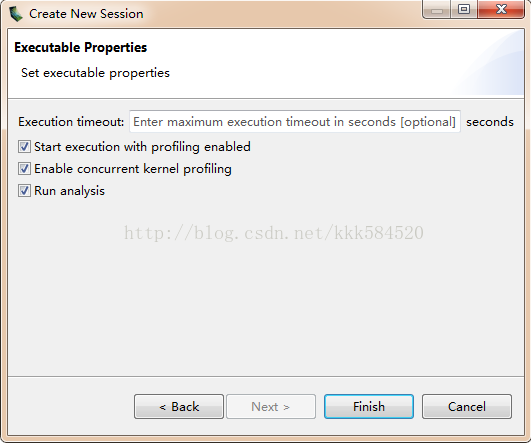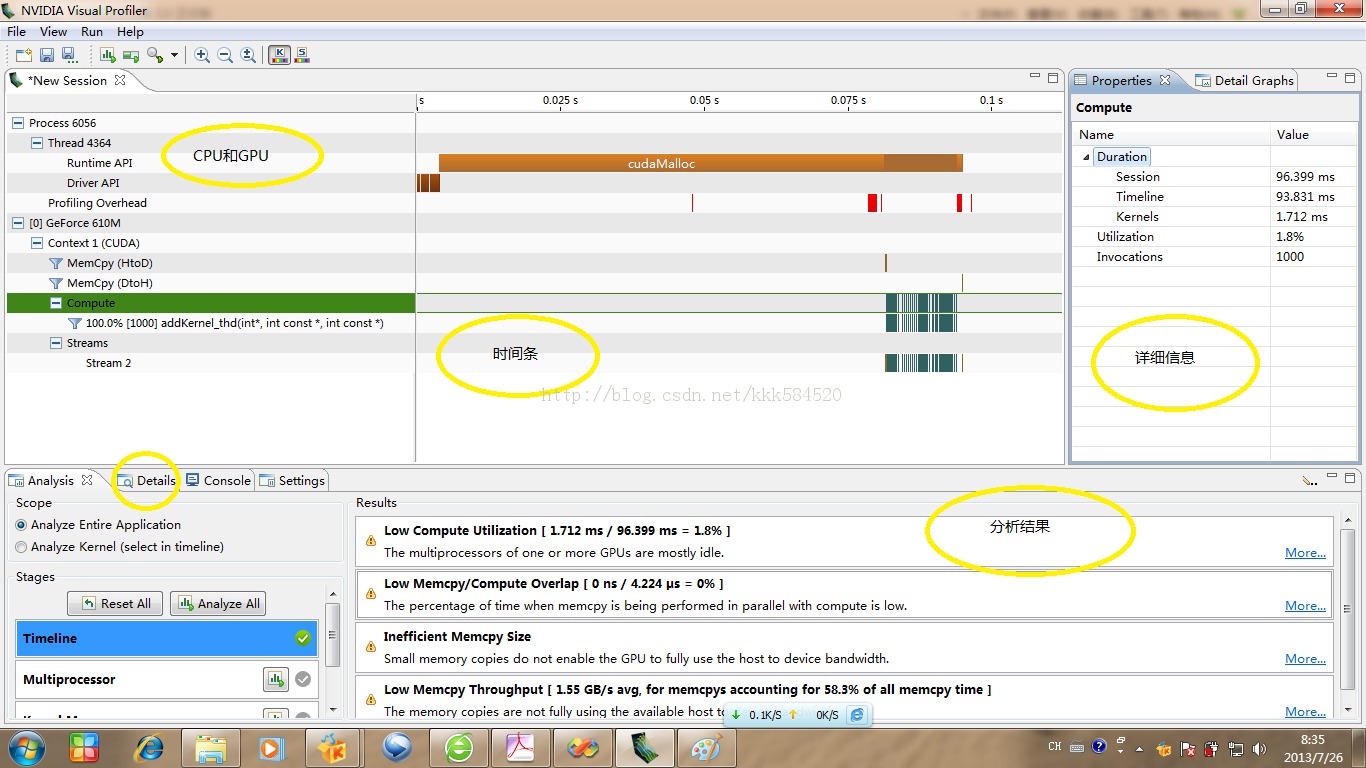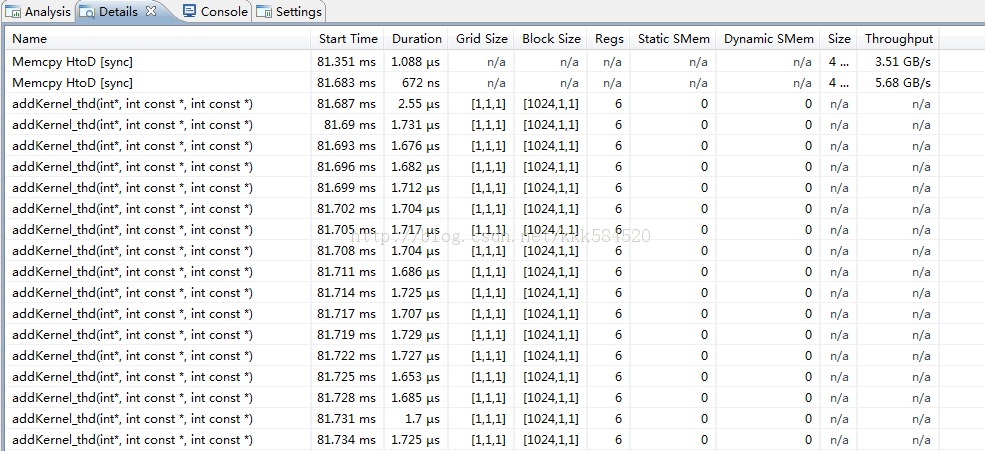589
社区成员
 发帖
发帖 与我相关
与我相关 我的任务
我的任务 分享
分享cudaEvent_t start,stop;//事件对象
cudaEventCreate(&start);//创建事件
cudaEventCreate(&stop);//创建事件
cudaEventRecord(start,stream);//记录开始
myKernel<<<dimg,dimb,size_smem,stream>>>(parameter list);//执行核函数
cudaEventRecord(stop,stream);//记录结束事件
cudaEventSynchronize(stop);//事件同步,等待结束事件之前的设备操作均已完成
float elapsedTime;
cudaEventElapsedTime(&elapsedTime,start,stop);//计算两个事件之间时长(单位为ms)
#include "cuda_runtime.h"
#include "device_launch_parameters.h"
#include <stdio.h>
cudaError_t addWithCuda(int *c, const int *a, const int *b, size_t size);
__global__ void addKernel_blk(int *c, const int *a, const int *b)
{
int i = blockIdx.x;
c[i] = a[i]+ b[i];
}
__global__ void addKernel_thd(int *c, const int *a, const int *b)
{
int i = threadIdx.x;
c[i] = a[i]+ b[i];
}
int main()
{
const int arraySize = 1024;
int a[arraySize] = {0};
int b[arraySize] = {0};
for(int i = 0;i<arraySize;i++)
{
a[i] = i;
b[i] = arraySize-i;
}
int c[arraySize] = {0};
// Add vectors in parallel.
cudaError_t cudaStatus;
int num = 0;
cudaDeviceProp prop;
cudaStatus = cudaGetDeviceCount(&num);
for(int i = 0;i<num;i++)
{
cudaGetDeviceProperties(&prop,i);
}
cudaStatus = addWithCuda(c, a, b, arraySize);
if (cudaStatus != cudaSuccess)
{
fprintf(stderr, "addWithCuda failed!");
return 1;
}
// cudaThreadExit must be called before exiting in order for profiling and
// tracing tools such as Nsight and Visual Profiler to show complete traces.
cudaStatus = cudaThreadExit();
if (cudaStatus != cudaSuccess)
{
fprintf(stderr, "cudaThreadExit failed!");
return 1;
}
for(int i = 0;i<arraySize;i++)
{
if(c[i] != (a[i]+b[i]))
{
printf("Error in %d\n",i);
}
}
return 0;
}
// Helper function for using CUDA to add vectors in parallel.
cudaError_t addWithCuda(int *c, const int *a, const int *b, size_t size)
{
int *dev_a = 0;
int *dev_b = 0;
int *dev_c = 0;
cudaError_t cudaStatus;
// Choose which GPU to run on, change this on a multi-GPU system.
cudaStatus = cudaSetDevice(0);
if (cudaStatus != cudaSuccess)
{
fprintf(stderr, "cudaSetDevice failed! Do you have a CUDA-capable GPU installed?");
goto Error;
}
// Allocate GPU buffers for three vectors (two input, one output) .
cudaStatus = cudaMalloc((void**)&dev_c, size * sizeof(int));
if (cudaStatus != cudaSuccess)
{
fprintf(stderr, "cudaMalloc failed!");
goto Error;
}
cudaStatus = cudaMalloc((void**)&dev_a, size * sizeof(int));
if (cudaStatus != cudaSuccess)
{
fprintf(stderr, "cudaMalloc failed!");
goto Error;
}
cudaStatus = cudaMalloc((void**)&dev_b, size * sizeof(int));
if (cudaStatus != cudaSuccess)
{
fprintf(stderr, "cudaMalloc failed!");
goto Error;
}
// Copy input vectors from host memory to GPU buffers.
cudaStatus = cudaMemcpy(dev_a, a, size * sizeof(int), cudaMemcpyHostToDevice);
if (cudaStatus != cudaSuccess)
{
fprintf(stderr, "cudaMemcpy failed!");
goto Error;
}
cudaStatus = cudaMemcpy(dev_b, b, size * sizeof(int), cudaMemcpyHostToDevice);
if (cudaStatus != cudaSuccess)
{
fprintf(stderr, "cudaMemcpy failed!");
goto Error;
}
cudaEvent_t start,stop;
cudaEventCreate(&start);
cudaEventCreate(&stop);
cudaEventRecord(start,0);
for(int i = 0;i<1000;i++)
{
// addKernel_blk<<<size,1>>>(dev_c, dev_a, dev_b);
addKernel_thd<<<1,size>>>(dev_c, dev_a, dev_b);
}
cudaEventRecord(stop,0);
cudaEventSynchronize(stop);
float tm;
cudaEventElapsedTime(&tm,start,stop);
printf("GPU Elapsed time:%.6f ms.\n",tm);
// cudaThreadSynchronize waits for the kernel to finish, and returns
// any errors encountered during the launch.
cudaStatus = cudaThreadSynchronize();
if (cudaStatus != cudaSuccess)
{
fprintf(stderr, "cudaThreadSynchronize returned error code %d after launching addKernel!\n", cudaStatus);
goto Error;
}
// Copy output vector from GPU buffer to host memory.
cudaStatus = cudaMemcpy(c, dev_c, size * sizeof(int), cudaMemcpyDeviceToHost);
if (cudaStatus != cudaSuccess)
{
fprintf(stderr, "cudaMemcpy failed!");
goto Error;
}
Error:
cudaFree(dev_c);
cudaFree(dev_a);
cudaFree(dev_b);
return cudaStatus;
}









